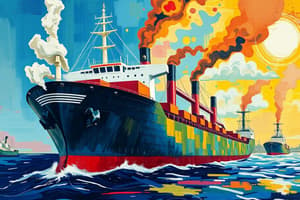Podcast
Questions and Answers
The shipping industry is a minor contributor to greenhouse gas emissions.
The shipping industry is a minor contributor to greenhouse gas emissions.
False (B)
Ships can discharge pollutants such as oil and chemicals into the oceans.
Ships can discharge pollutants such as oil and chemicals into the oceans.
True (A)
The International Maritime Organization has set targets to increase carbon emissions from shipping.
The International Maritime Organization has set targets to increase carbon emissions from shipping.
False (B)
Air pollution from shipping includes sulfur oxides (SOx) and nitrogen oxides (NOx).
Air pollution from shipping includes sulfur oxides (SOx) and nitrogen oxides (NOx).
New regulations are being developed to promote the use of dirtier fuels for ships.
New regulations are being developed to promote the use of dirtier fuels for ships.
Shipping significantly contributes to greenhouse gas emissions.
Shipping significantly contributes to greenhouse gas emissions.
The International Maritime Organization aims to increase carbon emissions from shipping.
The International Maritime Organization aims to increase carbon emissions from shipping.
Ships discharge pollutants like oil and chemicals into the oceans.
Ships discharge pollutants like oil and chemicals into the oceans.
Air pollution from ships only includes carbon dioxide.
Air pollution from ships only includes carbon dioxide.
New regulations are promoting the use of cleaner fuels in the shipping industry.
New regulations are promoting the use of cleaner fuels in the shipping industry.
The shipping industry significantly contributes to waterway pollution by discharging oil and chemicals into the oceans.
The shipping industry significantly contributes to waterway pollution by discharging oil and chemicals into the oceans.
New regulations are being developed to promote the use of fuel types that increase carbon emissions in shipping.
New regulations are being developed to promote the use of fuel types that increase carbon emissions in shipping.
Shipping does not contribute to greenhouse gas emissions.
Shipping does not contribute to greenhouse gas emissions.
Air pollution from ships includes sulfur oxides (SOx) and nitrogen oxides (NOx).
Air pollution from ships includes sulfur oxides (SOx) and nitrogen oxides (NOx).
The International Maritime Organization has set targets to enhance carbon emissions from the shipping industry.
The International Maritime Organization has set targets to enhance carbon emissions from the shipping industry.
Flashcards are hidden until you start studying
Study Notes
Carbon Emissions
- The shipping industry significantly contributes to global greenhouse gas emissions.
- The International Maritime Organization (IMO) has established ambitious targets aimed at reducing these emissions substantially.
- Meeting these targets demands transformative changes in fuel types and ship designs, emphasizing innovation and environmental responsibility.
Waterway Pollution
- Ships frequently discharge various pollutants, including oil, chemicals, and waste, directly into ocean waters.
- Such discharges can have catastrophic effects on marine ecosystems, adversely affecting biodiversity and the health of marine life.
Air Pollution
- In addition to carbon dioxide, shipping vessels emit harmful gases such as sulfur oxides (SOx) and nitrogen oxides (NOx).
- These emissions are responsible for deteriorating air quality and contributing to the occurrence of acid rain.
- Recent regulations are compelling the industry to adopt cleaner fuels and innovative technologies to reduce air pollution.
Carbon Emissions
- The shipping industry significantly contributes to global greenhouse gas emissions.
- The International Maritime Organization (IMO) has established ambitious targets aimed at reducing these emissions substantially.
- Meeting these targets demands transformative changes in fuel types and ship designs, emphasizing innovation and environmental responsibility.
Waterway Pollution
- Ships frequently discharge various pollutants, including oil, chemicals, and waste, directly into ocean waters.
- Such discharges can have catastrophic effects on marine ecosystems, adversely affecting biodiversity and the health of marine life.
Air Pollution
- In addition to carbon dioxide, shipping vessels emit harmful gases such as sulfur oxides (SOx) and nitrogen oxides (NOx).
- These emissions are responsible for deteriorating air quality and contributing to the occurrence of acid rain.
- Recent regulations are compelling the industry to adopt cleaner fuels and innovative technologies to reduce air pollution.
Carbon Emissions
- The shipping industry significantly contributes to global greenhouse gas emissions.
- The International Maritime Organization (IMO) has established ambitious targets aimed at reducing these emissions substantially.
- Meeting these targets demands transformative changes in fuel types and ship designs, emphasizing innovation and environmental responsibility.
Waterway Pollution
- Ships frequently discharge various pollutants, including oil, chemicals, and waste, directly into ocean waters.
- Such discharges can have catastrophic effects on marine ecosystems, adversely affecting biodiversity and the health of marine life.
Air Pollution
- In addition to carbon dioxide, shipping vessels emit harmful gases such as sulfur oxides (SOx) and nitrogen oxides (NOx).
- These emissions are responsible for deteriorating air quality and contributing to the occurrence of acid rain.
- Recent regulations are compelling the industry to adopt cleaner fuels and innovative technologies to reduce air pollution.
Studying That Suits You
Use AI to generate personalized quizzes and flashcards to suit your learning preferences.




